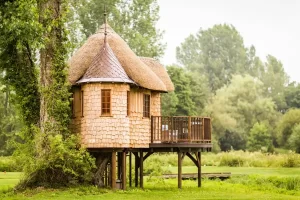In recent years, the global travel industry has seen a significant shift as more travelers seek to minimize their environmental footprint. This rising trend toward eco-friendly travel is driven by a growing awareness of the impact that tourism can have on the planet. From carbon emissions to waste generation, traditional forms of travel and accommodation have often come at a high cost to the environment. As a result, sustainability has become a key focus in the hospitality industry, with more hotels, resorts, and lodges adopting eco-conscious practices to meet the demands of environmentally aware travelers.
In this article, we will delve into the world of “Sustainable Stays,” exploring what makes an accommodation truly eco-friendly and uncovering some of the world’s premier eco accommodations. Whether you’re planning a getaway or simply curious about how the industry is evolving, this guide will provide you with insights into the benefits of sustainable travel and how you can make more environmentally responsible choices on your next trip.
The Importance of Sustainable Accommodations
Environmental Impact
Traditional accommodations, while offering comfort and luxury, often leave a significant environmental footprint. Large hotels and resorts can consume vast amounts of energy, contribute to water waste, and generate considerable quantities of waste, all of which have a detrimental effect on the environment. Additionally, many of these establishments are built without consideration for the surrounding ecosystem, leading to deforestation, habitat destruction, and a decline in biodiversity. The cumulative effect of these practices contributes to global environmental challenges such as climate change, pollution, and resource depletion.
Eco Accommodations
Eco accommodations are designed with the environment in mind, prioritizing sustainability at every stage—from construction to daily operations. These establishments often utilize renewable energy sources like solar or wind power, implement water conservation strategies such as rainwater harvesting, and use sustainable building materials that have a lower environmental impact. Beyond the environmental benefits, eco-friendly accommodations also strive to support local communities by sourcing food, products, and services locally, thereby reducing their carbon footprint and boosting the local economy. The goal is to create a harmonious relationship between the accommodation and its natural surroundings, ensuring that tourism contributes positively rather than detracts from the environment.
Traveler Responsibility
As travelers, we hold significant power in shaping the future of the hospitality industry. By choosing to stay in eco accommodations, we not only reduce our environmental impact but also encourage more establishments to adopt sustainable practices. Every decision we make, from the type of accommodation we choose to the way we interact with our surroundings, contributes to a larger movement towards responsible travel. It’s not just about enjoying a guilt-free vacation—it’s about making conscious choices that align with the values of sustainability and stewardship of the planet. By supporting eco-friendly accommodations, we can help drive the demand for more sustainable options, ensuring that travel continues to be a force for good in the world.
Key Features of Premier Eco Accommodations
Energy Efficiency
One of the most significant aspects of premier eco accommodations is their commitment to energy efficiency. These establishments often utilize renewable energy sources, such as solar, wind, or hydroelectric power, to reduce their reliance on fossil fuels. Solar panels are commonly installed to generate electricity, while some resorts are even designed to harness wind energy through turbines. In addition to renewable energy, smart technology plays a crucial role in energy conservation. Automated systems, such as motion-sensor lighting and climate control, ensure that energy is only used when necessary, significantly reducing waste. The integration of energy-efficient appliances and LED lighting further contributes to lowering the overall carbon footprint of these accommodations.
Water Conservation
Water is a precious resource, and premier eco accommodations implement a range of water-saving initiatives to minimize waste. Rainwater harvesting systems are often installed to collect and reuse water for irrigation, cleaning, and other non-potable uses. Low-flow fixtures, such as faucets, showerheads, and toilets, are standard in these establishments, significantly reducing water consumption without compromising on comfort. Some accommodations go a step further by recycling greywater (wastewater from sinks and showers) for landscaping purposes. These practices not only help conserve water but also ensure that the local water supply remains abundant and clean for the surrounding community and ecosystem.
Sustainable Materials
The use of sustainable materials in construction and furnishings is another hallmark of premier eco accommodations. These establishments prioritize materials that have a low environmental impact, such as reclaimed wood, recycled metal, and natural fibers like bamboo and hemp. Buildings are often designed with energy-efficient architecture in mind, incorporating natural ventilation, insulation, and lighting to reduce the need for artificial climate control. In addition to construction materials, eco-friendly accommodations often feature furniture and décor made from sustainably sourced, non-toxic, and biodegradable materials. This approach not only reduces the environmental footprint of the accommodation but also promotes a healthier indoor environment for guests.
Waste Management
Effective waste management is a cornerstone of eco-friendly hospitality. Premier eco accommodations strive to achieve zero waste by implementing comprehensive recycling programs, composting organic waste, and reducing the use of single-use plastics. Many establishments have eliminated plastic bottles, straws, and packaging, opting instead for biodegradable or reusable alternatives. Guests are often encouraged to participate in waste reduction efforts, such as separating recyclables or minimizing food waste. Composting organic waste is another common practice, with the resulting compost often used to fertilize on-site gardens or landscaping. By minimizing waste sent to landfills, these accommodations significantly reduce their environmental impact and set a positive example for guests and the industry as a whole.
Local and Organic Sourcing
Supporting local economies and reducing food miles are key priorities for premier eco accommodations. These establishments often source food, beverages, and other products locally, ensuring that they are fresh, organic, and sustainably produced. Organic farming practices are favored because they avoid the use of harmful pesticides and fertilizers, contributing to healthier soils and ecosystems. Many eco-friendly accommodations also grow their own produce in on-site gardens, providing guests with farm-to-table dining experiences. By choosing locally sourced and organic products, these establishments not only offer healthier and more sustainable options for guests but also help to support local farmers, artisans, and businesses, fostering a stronger connection between the accommodation and the surrounding community.
Top Sustainable Stays Around the World
Eco Resorts in Asia
Soneva Fushi, Maldives
Located on Kunfunadhoo Island in the Maldives, Soneva Fushi is a pioneering eco-resort that seamlessly blends luxury with sustainability. The resort is committed to environmental conservation, utilizing solar power to meet its energy needs and implementing advanced water filtration systems to reduce water consumption. Soneva Fushi also operates a robust waste management program, including a state-of-the-art recycling facility and an on-site organic garden that supplies fresh produce for the resort’s restaurants. Additionally, the resort’s architecture is designed to minimize environmental impact, with villas constructed from locally sourced and sustainable materials.
Six Senses Yao Noi, Thailand
Nestled on the island of Yao Noi in Phang Nga Bay, Six Senses Yao Noi is an eco-resort renowned for its commitment to sustainability. The resort’s villas are built using locally sourced timber and other sustainable materials, and they feature energy-efficient designs that make the most of natural ventilation and light. Six Senses Yao Noi also focuses on water conservation, utilizing rainwater harvesting and greywater recycling systems. The resort’s organic farm supplies fresh produce for its dining venues, and it actively supports local communities through various conservation and education programs.
Eco Lodges in Africa
Grootbos Private Nature Reserve, South Africa
Situated in the Western Cape of South Africa, Grootbos Private Nature Reserve is an eco-lodge dedicated to preserving the region’s unique biodiversity. The lodge’s buildings are designed to blend into the natural landscape, using sustainable materials and energy-efficient designs. Grootbos is a leader in conservation, with reforestation initiatives, wildlife protection programs, and a focus on restoring indigenous vegetation. The lodge also supports local communities through education and job creation, making it a model of sustainable tourism in Africa.
Campi ya Kanzi, Kenya
Located in the Chyulu Hills of Kenya, Campi ya Kanzi is an eco-lodge that offers an authentic African safari experience while prioritizing sustainability. The lodge operates entirely on solar power, and its water is sourced from rainwater harvesting systems. Waste management is a key focus, with all organic waste composted and other waste materials recycled. Campi ya Kanzi is also deeply involved in community development, working closely with the local Maasai people to protect the land and wildlife while providing education and employment opportunities.
Green Hotels in Europe
Hotel Milano Scala, Italy
Situated in the heart of Milan, Italy, Hotel Milano Scala is Europe’s first zero-emissions hotel. The hotel’s energy needs are met entirely through renewable sources, including solar panels and geothermal systems. The building is equipped with energy-efficient lighting and climate control systems, and guests are encouraged to participate in the hotel’s waste reduction and recycling programs. Hotel Milano Scala also sources its food from local organic farms, offering guests a sustainable dining experience in the city’s vibrant cultural center.
The Scarlet, United Kingdom
Located on the cliffs of Cornwall, The Scarlet is a luxury eco-hotel that emphasizes sustainability without sacrificing comfort. The hotel’s architecture is designed to reduce its environmental impact, featuring a green roof, natural ventilation systems, and renewable energy sources. The Scarlet also places a strong emphasis on water conservation, with a natural reed-bed filtration system and rainwater harvesting in place. The hotel’s restaurant serves locally sourced, organic food, and the spa uses natural, chemical-free products, ensuring a holistic approach to sustainability.
Eco-friendly Cabins in North America
The Ranch at Rock Creek, USA
Nestled in the rugged landscape of Montana, The Ranch at Rock Creek is an eco-friendly retreat that offers guests a sustainable luxury experience. The ranch’s cabins are built from reclaimed and sustainably sourced materials, and they feature energy-efficient designs that minimize the need for artificial heating and cooling. The Ranch at Rock Creek is committed to environmental stewardship, with initiatives that include wildlife conservation, land restoration, and sustainable agriculture. Guests can enjoy locally sourced, organic meals and participate in outdoor activities that emphasize a connection to the natural environment.
Clayoquot Wilderness Lodge, Canada
Located on Vancouver Island in British Columbia, Clayoquot Wilderness Lodge offers a unique blend of adventure and sustainability. The lodge’s canvas tents and cabins are built using eco-friendly materials and designed to minimize their impact on the surrounding wilderness. Clayoquot Wilderness Lodge is powered by a combination of solar and hydroelectric energy, and it has implemented extensive water and waste management systems to conserve resources. The lodge also supports local First Nations communities and engages in conservation efforts to protect the area’s pristine ecosystems.
Eco Villas in the Pacific
Pacific Resort Aitutaki, Cook Islands
Situated on the stunning Aitutaki Lagoon in the Cook Islands, Pacific Resort Aitutaki is an eco-villa resort that combines luxury with environmental responsibility. The resort’s villas are constructed from sustainable materials and designed to blend seamlessly with the natural environment. Pacific Resort Aitutaki is committed to reducing its carbon footprint through solar energy, water conservation, and waste reduction programs. The resort also sources its food locally, with an emphasis on organic and sustainable produce, and supports marine conservation efforts to protect the lagoon’s delicate coral reefs.
Nihi Sumba, Indonesia
Located on the remote island of Sumba in Indonesia, Nihi Sumba is an award-winning eco-villa resort known for its dedication to sustainability and community engagement. The resort’s villas are built using locally sourced materials, and the design incorporates traditional Sumbanese architecture. Nihi Sumba operates on renewable energy, with solar panels providing the majority of its power. The resort is also deeply involved in supporting the local community, with initiatives that include clean water projects, healthcare programs, and education for local children. Nihi Sumba’s commitment to sustainability extends to its farm-to-table dining, with organic produce sourced from its on-site farm.
Conclusion
Choosing eco accommodations is more than just a trend; it’s a crucial step towards responsible and sustainable travel. Eco-friendly accommodations offer a range of benefits, from energy and water conservation to the use of sustainable materials and waste reduction practices. By supporting these establishments, travelers can reduce their environmental impact, contribute to the preservation of local ecosystems, and support communities that prioritize sustainability. The diverse array of premier eco accommodations around the world—from luxurious eco resorts in Asia to green hotels in Europe—demonstrates that sustainable travel does not mean sacrificing comfort or style. Instead, it represents a commitment to a more conscientious way of experiencing the world.
As you plan your next trip, make sustainability a key consideration in your travel decisions. Look for accommodations that prioritize eco-friendly practices and align with your values. By choosing to stay in eco accommodations, you not only contribute to a healthier planet but also set an example for others. Share your experiences and spread the word about the benefits of sustainable travel to inspire more people to make responsible choices. Every small action contributes to a larger movement towards a more sustainable future.
The future of the hospitality industry is increasingly intertwined with sustainability. As awareness of environmental issues grows, more hotels, resorts, and lodges are likely to adopt eco-friendly practices and innovate with new technologies to reduce their environmental footprint. Travelers can expect to see a continued emphasis on green building standards, renewable energy, and local sourcing as key features of future accommodations. By staying informed and engaged, we can all play a part in shaping a travel industry that respects and preserves the beauty of our planet for generations to come.




